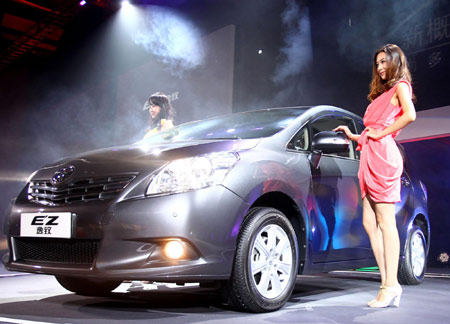Japanese brands top quality survey of recent car buyers
Updated: 2011-11-15 14:05
(chinadaily.com.cn)
|
|||||||||||
|
 Although quality recognition of Japanese brands still lags German competitors in China, they performed extremely well in the latest China Initial Quality Study (IQS) by influential industry analyst JD Power Asia Pacific. [Photo/Xinhua] |
Although quality recognition of Japanese brands still lags German competitors in China, they performed extremely well in the latest China Initial Quality Study (IQS) by influential industry analyst JD Power Asia Pacific.
The study, now in its 12th year, examines problems reported in the first two to six months by owners of new vehicles. The survey examined reported vehicle problems in two distinct categories - quality of design and quality of production - including defects and malfunctions.
Models from Japanese brands, as a whole, had the lowest rate of problems in the Chinese market in 2011, the survey found.
The study ranked Japanese cars highest in seven of 11 market segments. The Suzuki Alto, Suzuki Swift, Honda Fit, Nissan Tiida, Toyota Corolla EX, Mazda6, Toyota Crown, and Honda CR-V all topped their competitors.
"Quality in the IQS study refers to the vehicle's short-term daily performance after delivery. Customer recognition of a vehicle or a brand is a complicated feeling, which they may generally call quality," said Mei Songlin, general manager of research services, JD Power Asia Pacific, Shanghai.
He noted that some Japanese car dealerships have even been known to complain that earnings were low from after-sales services because few cars came in for repairs.
Gary Xiong, owner of a Toyota Reiz, said he was not surprised by results of the survey.
Now a Beijing office professional in his early 30s, his first car was a Toyota Vits - a previous version of the Yaris - a popular entry-level small Toyota.
Now he is driving a mid-sized Toyota Reiz and is dreaming of a Lexus, the high-end brand by Toyota.
"I think quality and safety are distinct perceptions. Quality gives people direct feelings about the car under daily and ordinary conditions, while safety is usually tested under extreme conditions," he said. "Although lighter than many German cars, Japanese cars perform well in daily driving and are economical.
"Compared to cars of the same level, they have nicer interiors and provide more comfort to both the driver and passengers," he added.
Taste and perceptions also vary by location. A netizen tagged fsdrw08 recalled: "Once I first stepped out of the Beijing West Railway Station, I saw the roads mostly carried German cars. But my home province Guangdong is a world of Japanese cars."
He said in Foshan, Guangdong, the Nissan Tiida is now the most commonly seen model. In the past, it was the Honda Fit.
According to the JD Power quality study, the most frequently reported problem in 2011 was fuel economy, a measure in which Japanese cars usually perform better.
A three-month study by the Shanxi Daily newspaper targeting people aged 25 to 50 in different professions found that 87 percent of respondents consider fuel consumption the foremost concern before a car purchase.
"Japanese cars cater to the demands of many Chinese who prefer a magnificent appearance with delicate interior designs," said Xu Changming, deputy director of the information resource department at the State Information Consultancy Center.
"That may partly explain why middle and high-end Japanese models are so popular in China," he added.
According to statistics from the China Association of Automobile Manufacturers, Japanese brands had the biggest market share in China in July - some 23.2 percent - considered a sign of recovery after the devastating tsunami that hit Japan in March, disrupting car and parts supplies.








